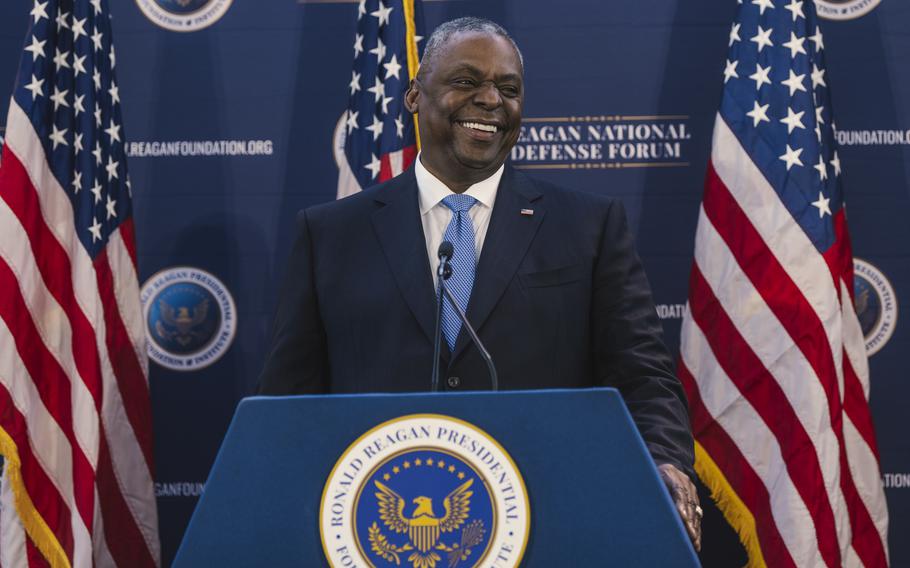
Defense Secretary Lloyd Austin delivers the keynote address at the 2023 Reagan National Defense Forum at the the Ronald Reagan Presidential Library, Simi Valley, Calif., on Dec. 2, 2023. (Chad J. McNeeley/Department of Defense)
WASHINGTON — Defense Secretary Lloyd Austin returned to Walter Reed National Military Medical Center on Friday for a follow-up examination after his prostate cancer surgery last month and is expected to make a full recovery, his doctors said.
“Beyond planned physical therapy and regular post-prostatectomy follow-up appointments, he has no planned further treatment for his cancer,” said John Maddox and Gregory Chesnut, doctors at the medical facility in Bethesda, Md.
Austin has been working from home, and Tuesday participated in a meeting of the Ukraine Defense Contact Group to discuss providing further assistance and weapons to Ukraine to help beat back the Russian forces that invaded nearly two years ago. It was his first public appearance since his undisclosed hospitalization for his cancer treatment.
Austin, 70, was released from the hospital on Jan. 15 where he spent two weeks after experiencing complications from surgery, which was conducted Dec. 22. The secretary has come under scrutiny after he failed to notify President Joe Biden and other government officials about his illness and hospital stay.
During a regular health screening in early December, Austin’s cancer was detected. He was admitted to the hospital about three weeks later for a prostatectomy, which involves surgery to remove part of the prostate gland. The doctors called it “a minimally invasive surgical procedure.” Austin was under general anesthesia during the surgery and left the hospital the following morning.
On Jan. 1, Austin returned to Walter Reed after experiencing pain in his abdomen, hip and leg, the doctors said. He was later found to have a urinary tract infection, and Austin spent days in the intensive care unit before he was moved to a private section of the hospital.
During Austin’s medical treatments, no one at the Defense Department notified the White House, Deputy Defense Secretary Kathleen Hicks, Congress or the public for several days. On Jan. 2, Austin transferred some of his more pressing responsibilities to Hicks.
Biden did not learn of Austin’s prostate cancer until Jan. 9, National Security Council spokesman John Kirby said at the time. That same day, the White House ordered all Cabinet members or secretaries must immediately notify the administration if at any time they cannot perform their duties.
The Defense Department inspector general announced Jan. 11 that Austin’s handling of his hospitalization will be investigated. The IG review announcement followed a Pentagon announcement that it would conduct a separate 30-day review of the incident.
The House Armed Services Committee has scheduled a hearing on Feb. 14 for Austin to testify about why his recent hospitalization was kept secret from lawmakers and other top officials. A similar hearing in the Democrat-led Senate has not been called, though some Republicans on the Senate Armed Services Committee have demanded one.